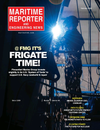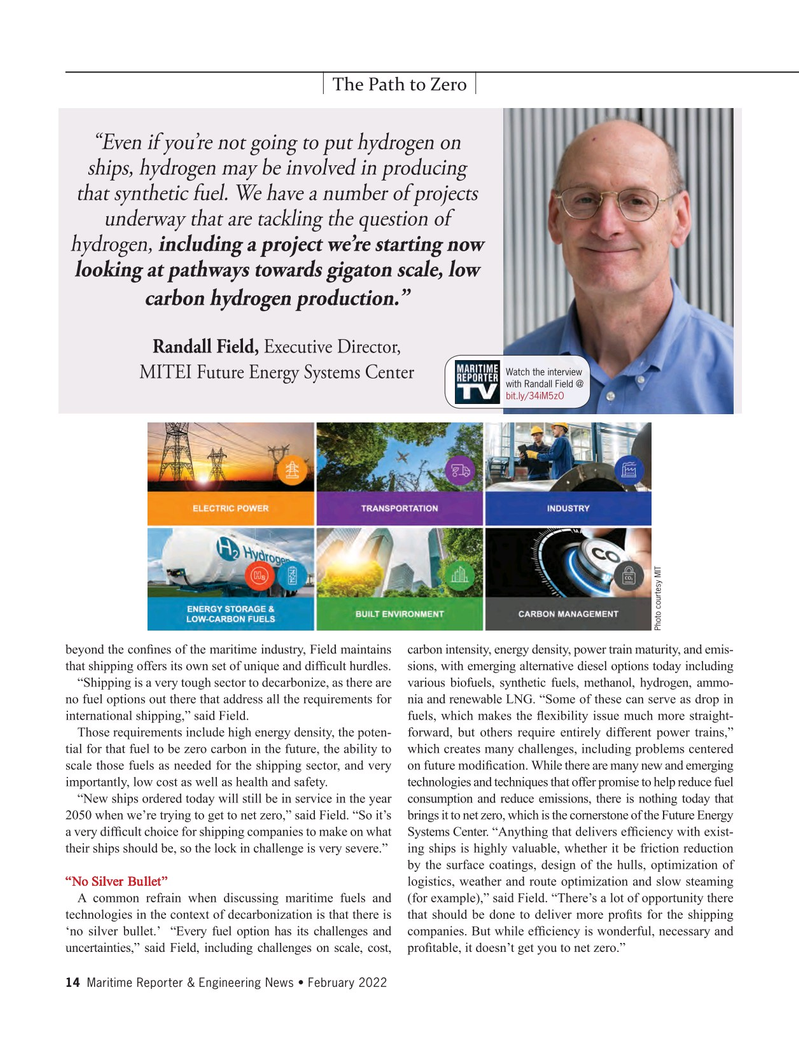
Page 14: of Maritime Reporter Magazine (February 2022)
Government Shipbuilding
Read this page in Pdf, Flash or Html5 edition of February 2022 Maritime Reporter Magazine
The Path to Zero “Even if you’re not going to put hydrogen on ships, hydrogen may be involved in producing that synthetic fuel. We have a number of projects underway that are tackling the question of hydrogen, including a project we’re starting now looking at pathways towards gigaton scale, low carbon hydrogen production.”
Randall Field, Executive Director,
Watch the interview
MITEI Future Energy Systems Center with Randall Field @ bit.ly/34iM5zO
Photo courtesy MIT beyond the confnes of the maritime industry, Field maintains carbon intensity, energy density, power train maturity, and emis- that shipping offers its own set of unique and diffcult hurdles. sions, with emerging alternative diesel options today including “Shipping is a very tough sector to decarbonize, as there are various biofuels, synthetic fuels, methanol, hydrogen, ammo- no fuel options out there that address all the requirements for nia and renewable LNG. “Some of these can serve as drop in international shipping,” said Field. fuels, which makes the fexibility issue much more straight-
Those requirements include high energy density, the poten- forward, but others require entirely different power trains,” tial for that fuel to be zero carbon in the future, the ability to which creates many challenges, including problems centered scale those fuels as needed for the shipping sector, and very on future modifcation. While there are many new and emerging importantly, low cost as well as health and safety. technologies and techniques that offer promise to help reduce fuel “New ships ordered today will still be in service in the year consumption and reduce emissions, there is nothing today that 2050 when we’re trying to get to net zero,” said Field. “So it’s brings it to net zero, which is the cornerstone of the Future Energy a very diffcult choice for shipping companies to make on what Systems Center. “Anything that delivers effciency with exist- their ships should be, so the lock in challenge is very severe.” ing ships is highly valuable, whether it be friction reduction by the surface coatings, design of the hulls, optimization of “No Silver Bullet” logistics, weather and route optimization and slow steaming
A common refrain when discussing maritime fuels and (for example),” said Field. “There’s a lot of opportunity there technologies in the context of decarbonization is that there is that should be done to deliver more profts for the shipping ‘no silver bullet.’ “Every fuel option has its challenges and companies. But while effciency is wonderful, necessary and uncertainties,” said Field, including challenges on scale, cost, proftable, it doesn’t get you to net zero.” 14 Maritime Reporter & Engineering News • February 2022

 13
13

 15
15
